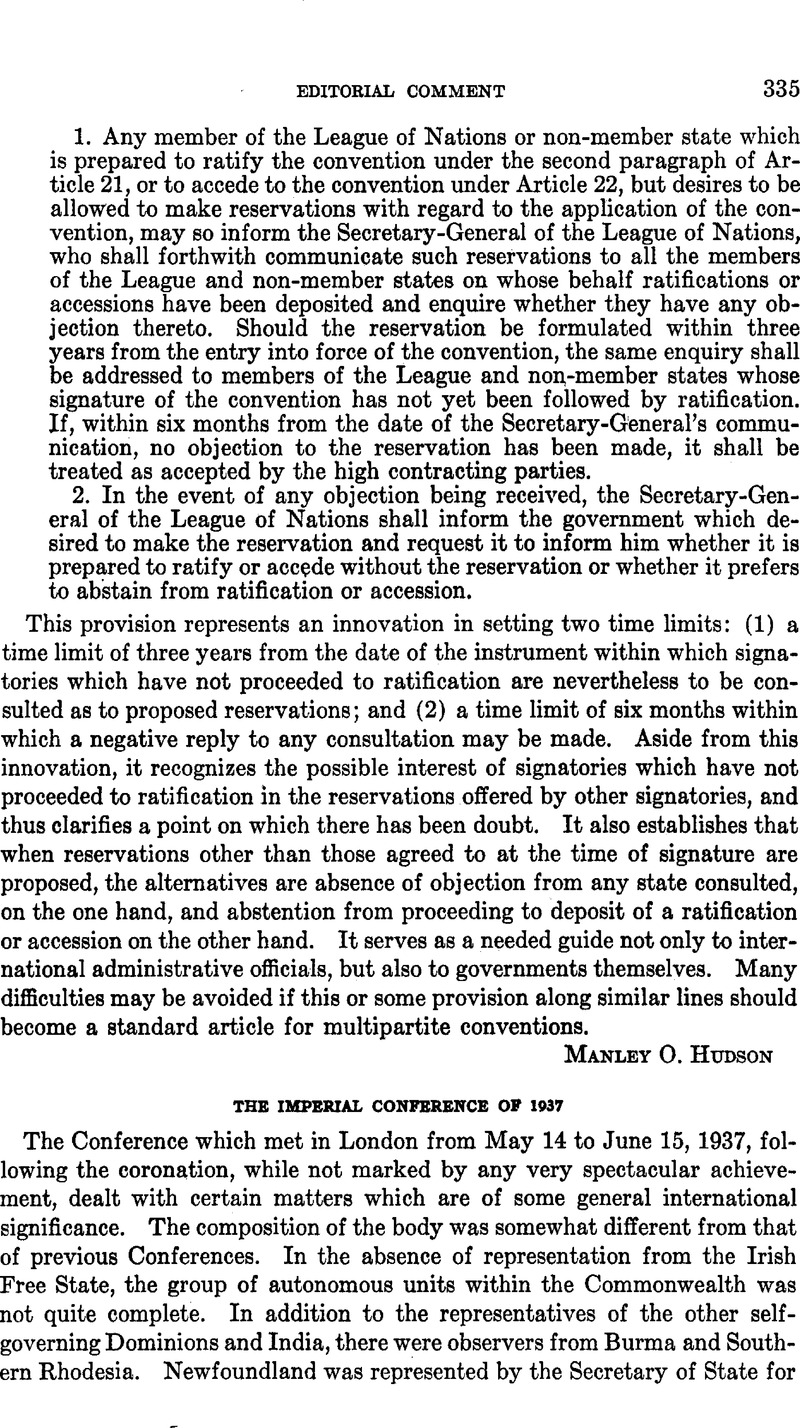No CrossRef data available.
Article contents
The Imperial Conference of 1937
Published online by Cambridge University Press: 12 April 2017
Abstract

- Type
- Editorial Comment
- Information
- Copyright
- Copyright © American Society of International Law 1938
References
1 Imperial Conference, London, 1937, Summary of Proceedings (Cmd. 5482), p. 62 (remarks of Prime Minister Chamberlain).
2 Id., p. 65 (remarks of Prime Minister Mackenzie King).
3 Id., p. 70 (remarks of Sir Muhammad Zafrullah Khan, on behalf of the Indian delegation).
4 Soward, F. H., “The Imperial Conference of 1937,” Pacific Affairs, Vol. 10, pp. 441, 444 (Dec, 1937).CrossRefGoogle Scholar Cf. John, Coatman, “The Imperial Conference,” Political Quarterly, Vol. 8, pp. 311–325 (July-Sept., 1937);Google Scholar Kingsley, Martin, “Is the British Empire in Retreat?” Yale Review, Vol. 27, pp. 12–29 (Autumn, 1937)Google Scholar.
5 Summary of Proceedings, p. 66.
6 Id., p. 57.
7 Id., p. 53, 54. With this may be read the Prime Minister’s earlier remarks (at p. 52 of the Summary of Proceedings) on the impracticability, under existing conditions, of fully achieving Covenant ideals, and the desirability of examining the position of the League.
8 Id., p. 58.
9 Id., p. 62. At the opening of the Conference, Prime Minister Baldwin had referred to British belief in “agreement as the mainspring” and “democratic institutions as the method” of government. He added that the British did not underestimate “the value of that idea to which other ways of government attach supreme importance—the idea of service to the State.”
10 The general problem is summarized in Ch. XVII of The British Empire (1937), a volume issued under the auspices of the Royal Institute of International Affairs.
11 Rex v. Francis. Ex parte Markwald (1918), 1 K. B. 617; Markwald v. Attorney-General (1920), 1 Ch. 348.
12 4 & 5 Geo. 5, c. 17; 8 & 9 Geo. 5, c. 38; 12 & 13 Geo. 5, c. 44; 23 & 24 Geo. 5, c. 49.
13 Ch. XX of the volume referred to in note 10, supra. The pertinent provisions of the Irish legislation are quoted, and reference is made to the possible bearing upon this of the decision in Moore and Others v. Attorney-General for the Irish Free State and Others (1935),A. C. 484. According to the Judicial CJommittee’s decision, the Irish Free State Legislature could, after the Statute of Westminster went into effect, pass an act repugnant to an Imperial Act. See also Irish Jurist, Vol. 1 (1935), pp. 2, 10, 23.
14 Summary of Proceedings, p. 26.
15 This JOURNAL, Supp., Vol. 24 (1930), pp. 192–200.
16 Summary of Proceedings, p. 28, and volume referred to in note 10, supra, pp. 312–313.
17 Summary of Proceedings, p. 27. For the 1926 form, see Cmd. 2768 of 1926, pertinent parts of the text of which are in this JOURNAL, Supp., Vol. 21 (1927), pp. 29–32, 37–38.


